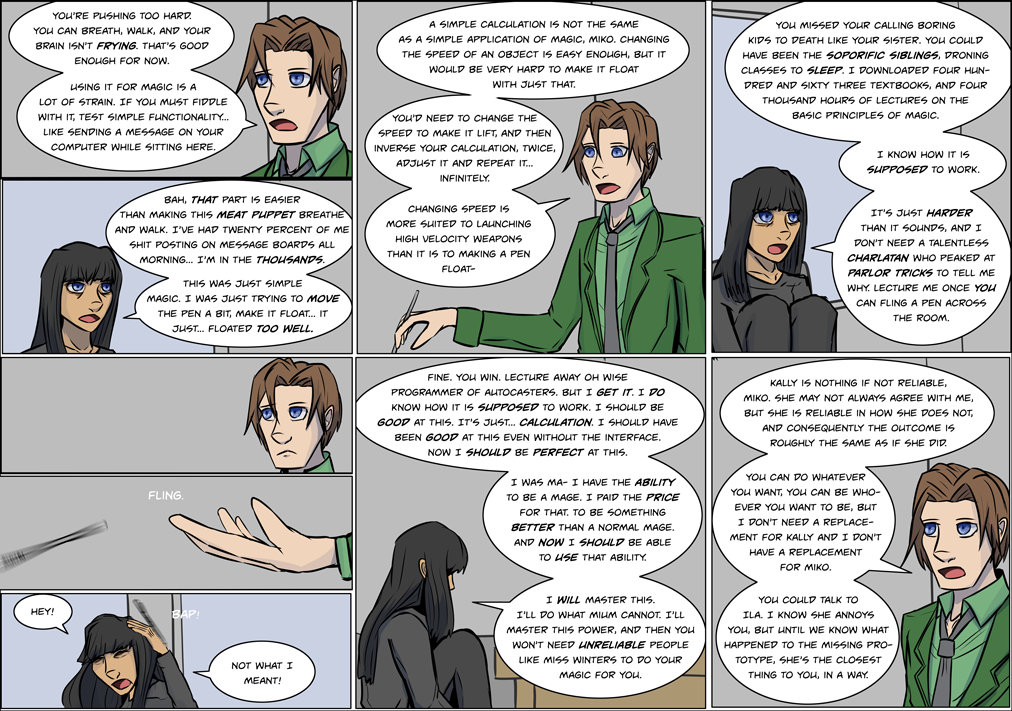Comic for Monday, April 5th, 2021
I think one of my regrets of the comic is that I never really properly shoe-horned in a more detailed explanation of how magic works. It’s in things like that probably better planning out story structure and being a more experienced writer probably comes in – the problem arises from the fact that almost all the characters that would practically talk about it, already know at very least the principles of it. Peter, being someone that doesn’t typically use magic much himself much, but seems to have some clever tricks for programming autocasters do various things, is sort of the perfect vehicle for exposition of it in a way because he has an inherently very mechanical knowledge of how it works – very few characters have a better analytical grasp on it than he does (aside from someone like Mium, who arguably has far too analytical a grasp on it), but there’s rarely a case that it would make sense for him to explain it, because everyone that he could explain it to would tell him to take a hike, given that they’d already know at least the basics.
Bits and pieces of explanations have been in various pages, but it’s sort of a picture built over small pieces over years, and probably more complicated than it has to be given that the magic system itself is fairly straight forward. At some point I should probably just put a detailed description of it on the wiki, or at least a summary of what could have gleaned from the various bits and pieces that have appeared in the comic so far.
The extent that Peter can or cannot use magic is somewhat ambiguous, but it should be noted that many (or perhaps even most) people can use magic with an autocaster and some training, though how good they are at it varies somewhat – the simpler the autocaster the more people can use but the more limited its functionality. As we saw with Miko trying to move the pen in the last page, many people that can use a more general autocaster simply use it just far too slowly for it to be of practical use in a combat situation (though it’s still sometimes useful). Translating Eidos calculations to a computerized load is a tricky business though, and it’s a bit more complicated than just mathematics – there’s a certain layer of translation. Mium is quite good in this in theory, being far more proficient than a typical computer at handling Eidos data – to the point that Rovak seems to suspect that Mium can read and understand Eidos data to an extent, but seems to still lack something in terms of writing to it. On the other hand of the spectrum is someone like Naomi who’s translation layer goes almost all the way from “conceptual” to “write to Eidos” without her generally being aware of most of the steps in between, effectively allowing her to skip the conscious calculation (which is what is typically called Innate Mages… they don’t even strictly need to know Eidos exists to use their ability in many cases, though the rate of Innate Mages among populations that are aware of Eidos is significantly higher than among populations that don’t – vastly so – suggesting that many will likely be unaware of an innate talent without prior knowledge of Eidos… or that magic is even possible).
Making something float is quite fair bit harder than fling it across the room – there’s probably a dozen ways to do it, but almost all of them would involve multiple calculations. Peter could probably do it in one single variable calculation, which he would have gotten to if his lecture had continued long enough. Peter is both the best and the worst teacher of magic – he has a better grasp on the fundamental nature of it than many natural or innate mages who rely more heavily on the translation layer of turning intent into magic, but in a way not as good as that understanding of during intent into magic is often the more useful part for people that want to use magic quickly to the point where they cannot really be said to doing the mental calculation anymore – no one can really calculate magic faster than a bullet, at some point its more like embedding some of the calculations into the translation layer – muscle memory of calculations in a way; even the main example of a Natural Mage (Kally) has the calculation formula for her dragon sort of directly stored in her calculation layer (Eidos Key) to the point where she couldn’t really be said to be calculating it when she calls it at this point – calculating it from scratch would be almost impossible; more over, because she is storing such a complicated calculation like that, it somewhat impairs her ability as a Natural Mage, sort of like how Innate Mages tend to struggle more with being calculations outside of their innate magic compared to a Natural Mage that isn’t also a Innate Mage… all of which to say the line between Innate Mage and Natural Mage is fuzzy one.
Now if you want fuzzy lines… Miko is perhaps something of an Artificial Natural Mage at this point 😀





I agree with all of what you just said.
But.
Peter used the word ‘is’. Not ‘was’. That indicates an active thought/action/behavior that will get him a close encounter of the Fluffy kind if it continues.
… and that was supposed to be a reply to Glider …
Didn’t they have that conversation already, when she declined going with Arron’s forces, back to Central?
“I’ve faced my consequences long ago. I’m just a productive exile. Even if they cannot arrest you, you have a lot left to lose. You’re the heir of Summers.”
He wanted her to go with Arron. She didn’t agree. I’m not sure if he predicted that “reliable” outcome, but he accepted it.
For reasons that I do not understand, we have to hit reply twice.
Pick where you want to reply. Hit reply. If you then fill out the form, it will be a new comment rather than a reply.
Instead, go back to the original comment you wanted to reply to, and hit reply a second time. You’ll see where the first time it said “comment”, now it says “replying to”. You’re good to go.
Except right now it seems 100% of the comments are filtered. So if you’re like me and you frequently edit to correct your typos and grammar issues… you’re out of luck. Proof read before hitting submit.
On the bright side, I no longer have to scroll from top to bottom to reread the post, it seems to edit reliably right below the content I’m replying to.
All this to say… I can only assume that Peter had decision trees ready for both scenarios. I like to think that while he might be worrying about Kally, somewhere in there he was pleasantly surprised at her choice.
What if it just says “Reply to” rather than “Replying to”?
“She is reliable in how she does not, and consequently the outcome is roughly the same as if she did”
Peter, I have a protip for you. Don’t ever repeat that. Ever. You just announced that you manipulate your girlfriend so that her decisions become invalidated.
Now, yes, she knows that you do it. But don’t ever say it. Not unless you would rather not have a girlfriend.
That’s not how I read that.
Given what we know, the manipulation came first. The girlfriend part came later. Without question, the relationship started when they started to trust one another.
My take on that is that Kally now may still disagree with Peter, but trusts him enough to follow his lead on the big picture.
Which really begs the question of how they arrived at where they were when this comic began. Was it Peter who didn’t trust? But then why now claim she is trustworthy and predictable? Or did the predictions just show a poorer outcome for Kally without Peter walking away?
I suppose that’s the path that makes it make sense for me. There was a calculated chance that Kally was out of his life, but any other path led to a worst outcome for Kally than Peter would tolerate.
Panel 1: can breath -> can breathe
I think Panel 1 should probably read “breathe” rather than “breath”.
“I think one of my regrets of the comic is that I never really properly shoe-horned in a more detailed explanation of how magic works.” I agree. I’ve always had the feeling that there was a lot of “backstory” somewhere that I hadn’t read, and that everyone else had read and knew all about it. The comic starts in medias res, after all, and that can be difficult to sustain indefinitely. The reader starts to look for a narrative payoff at some point.
I know exposition is supposed to be a “narrative killer,” but you’ve created a complex world with even more complex characterization. The supplemental information really helps flesh it out and increases the enjoyment.
I think it is just that is clear there is so much of this world we don’t get to see, in depth and timeline. There are events years and even decades before the comic that we know happened, but have relatively little detail on in the comic.
As I recall PastUtopia once noted that when he converted it from a novel to a comic in an effort to learn to draw, he just skipped to a part that seemed interesting, which is why it starts so abruptly.
Personally I love it, but its clear the comic will only ever be a tiny fragment of the story, and I would love to see PastUtopia return to writing the book form when he has time. The little bit of Tyler’s story we got was great and just had the ridiculous depth to world building and character development I crave.
Panel 1 should probably read “breathe”, rather than “breath.”
I definitely agree on the exposition part.
There are several authors whose works would have been much better if they had spread out the exposition and/or included any exess exposition in author’s notes/Q&A chapters.
The other disadvantage you have in explaining how magic works is that you’re doing a webcomic and not a novel, so you can’t just put it into the “main text” (i.e., outside of dialogue).
I happen to be rereading Dresden Files ATM, and he tends to do, essentially, asides explaining the results to the reader… but that doesn’t work in a webcomic.
when i tried to post a comment, it wouldn’t show up.
Ah, it seems to be working now (though I notice that replies are often going to the top level unless you click reply twice to ensure the comment is a reply).
Testing the double click reply thing. I’m guessing it is right, because the first try said I was posting, but now it says I’m replying.
As a writer, albeit not a master, I’ve found that while sudden exposition can be excused or forgiven it goes over better if you avoid it when you can. What’s really important is that YOU understand how it works enough that it functions consistently every time. If the magic you write is consistent enough then the readers will start to grasp it’s limits without it being directly explained. So I’d say that the bit of exposition we’re getting right now is very organic and fits the setting and characters as there is a very experienced character attempting to teach a less experienced character.
In short, it’s actually probably better this way than if you had “shoe-horned in a more detailed explanation of how magic works” earlier in the comic.
Apart from the fact that this is chapter 16, I agree.
I think Past probably does, too, but is just frustrated that it took him so long to figure out how to put this here.
To me, Peter’s autocasting expertise is very reminicent of Antrygg Windrose’s magic expertise in the first couple of books of the Windrose chronicles. Antrygg’s this unmatched spellcaster who basically never casts magic because he’s on the run and people could use it to find him. At least, up until the point that he does. And the protagonist is astonished by this, because it’s basically the first time she’s seen him do anything and it’s the sort of super-effective you’d expect for someone with his reputation. Up until that point, there’s just been a lot of heavy foreshadowing that something like that could happen. It just doesn’t.
With Peter, we’ve seen him do stuff with hard light projection spires in chapter 7, and again in chapters 13 and 14, but that’s different, as he wasn’t even there most of the time, and certainly not visibly doing anything. Of course, I expect we’ll never see him visibly doing anything when he’s doing his tricks, because that’s part of his stage magician aspect. He’s the sort of magician who makes things happen, not the sort who makes it obvious he’s the one doing it.
It’s also possibly worth pointing out that he wasn’t necessarily using an autocaster for those, as projecting hard light images is likely what hard light projection spires *do*. But he almost certainly used an autocaster in chapter 10. Just not on panel. So there’s other things he could have possibly used instead. We just don’t know for sure.
Not really.
What we do all the time without thinking about it is interact with constant feedback. Actually doing the calculation on how much energy it would take to throw the ball to a particular point wouldn’t be too helpful, because we can’t really activate our arms to give a precise, measured amount of force. What we *can* do is replicate a similar amount of force to what came close to working before. This applies to both throwing and catching the ball, as well as this dance of not quite falling over that we call walking and running.
To be fair, it’s still a lot of calculations, it’s just very different than the calculations that someone like Mium would do, for example.
Of course, like any sort of calculations, some people are better at it than others, which is why I can do the math to figure out how much force I would need to throw a ball to a certain target, but I can’t *use* that, unless I have a machine and I know enough about its mechanism to understand how to translate its reliable, measured application of force to my purpose. However, if I try to just throw the ball, I will miss nearly every time.
Granted, different people are different, and there may be some people out there who actually *do* the sorts of calculations directly, and can actually apply them. That could explain how some people can get to the level of skill demonstrated by professional athletes. But there are at least some professional athletes who are as bad at math as I am at being athletic.
Filed under we may be computers, but we’re generally not *that* kind of computer.
And in some ways it doesn’t have to be the “real” calculation, because we just want to get “close enough.” We don’t need the exact trajectory, we just need a “close enough” curve, which basically means any smooth-looking curve (especially given that we can continue to adjust as the trajectory continues).
This is true. Our method of learning is entirely based on repation. Theat is wy practice at doing something is so important. Our ‘balance’ becomes more accurate the more we use our mechanisms to do that of course as we age our bodies are not as accurate in some aspects and we have problems. I’m just beginning to hit the point where my body isn’t doing quite as well as when I younger.
In a way you do horrendously complicated math every time you catch a thrown object. You guess usually correctly on a bunch of factors you don’t know fully when you do it. We are walking upright and moving before we can talk simply by watching other people do it and a little encouragement. Harder than a ball is a Frisbee, yet we catch them and throw them to the next person almost without looking.
Given that most of the cast ostensibly do ludicrously advanced math in their heads on a regular basis, there’s a surprising lack of them demonstrating it outside of magic…
I mean, yeah, there haven’t been any situations where it makes sense to have people calculate the square root of seven or solve differential equations. But still, you could arrange for one, so we can compare calculation speeds…
Also, what proportion of the population is fluent in math, compared to today? Does it affect elections if more people in general can read statistics?
I suspect a higher percentage of the population would be fluent in math if it let them do magic. Though that’s sort of the difference between a natural mage and someone using a calculator/autocaster. Everyone can do math with a calculator and a bit of training how to use it, but a smaller percentage of people can get extremely good at doing math in their head.
That said… it’s not a perfect comparison.
Eidos calculations are comparable to doing complicated math mathematical calculations (which is why they are called that) but is also slightly different due to a humans ability to translate them to a degree – they essentially autocomplete with intent at a point as far as the conscious mind is concerned, and that point can be extended based on the individual (how innate their talent is) and training – repeatedly doing a calculation over and over can make partially ingrained in your ability to calculate it; the calculation is sort of assembling the preconditions for the Eidos key to actualize the change.
The comparison between Eidos calculations and math isn’t one to one though – someone good at a math isn’t necessarily good at Eidos calculations, though they aren’t entirely unrelated skill sets. Computerized-Miko could do math at very high speed when hooked into Mium’s system, and was one of the ways Miko tested being connected to Mium’s system, is that running on a computer meant that defined mathmatically equations would automatically resolve – just be thinking about a complex mathmatically equation, Miko was also aware of the answer, but here we are seeing that Miko struggles to complete a simple Eidos calculation
To add an additional wrinkle though, we’ve seen that excessively analytical characters can struggle with doing Eidos calculations, as at a point you start getting in your own way – Eidos calculations tend to work best with a slightly brainmelting degree of vagueness as the actual calculation is too complicated to fully grasp – the calculation is more of a framework for intent, getting it close enough to correct for it to be translated into actualizing the magic, than it is calculating the exact substitution.
This has some interesting ramifications, in that different mages may have different vehicles for making an Eidos calculation, as all they really need to do is to format their intent in a specific way that can be translated to Eidos data – as noted, some societies can do magic without even being aware Eidos exists, but it’s like doing biology without being aware microbes exist – you’ll get it right sometimes, but often for the wrong reasons (like old time thinkers that thought sewage created miasma – they correctly knew sewage was bad, but not why – a mage can correctly be taught a thought pattern [calculation] that’ll move an object without knowing they are calculating its Eidos data).
I think a useful comparison (but not a direct metaphor) for Eidos is basic ballistics. There is a lot of math involved in calculating the exact arc and landing point of a thrown projectile, but a good target shooter isn’t doing all the math per se. They have developed an intuition of how things fly, how wind will push the object, etc. They don’t consider numbers, they do what feels right.
A natural mage is therefore *not* doing math – or at least they are doing math like a lazy physics student, rounding everything off to the nearest power of ten and guesstimating. They just understand magic at a deep enough level to freestyle it and get “close enough”.
Exactly. If a fielder catching a fly ball had to consciously calculate where the ball was going to fall, almost nobody would ever catch a fly ball. They have simply done it enough times that the necessary estimations/calculations are done completely unconsciously. That seems very much like what natural mages do.
Yes, I noticed that, too.
It thinks I already made the comment I want to make, but there is no comment showing, which suggests to me that it confused itself with my double tap on “post comment.”
So, I will skip the terribly witty post I made originally and merely note that one or more of your intrepid readers would be more than willing to gather the observations you’ve made on magic through the story and through author’s commentaries. They might even sort through them and organize the thoughts a bit.
If only somebody were to suggest such a thing to them…
I suspect that if you asked your loyal readers, more than a couple would be thrilled to gather the explanations that have leaked through the combination of story and author’s commentaries and put them into some sort of order.
Or, hey, if you merely commented that such a gathering would be nice and then some reader suggested it to the others, that might prompt said others to act, even without your making a direct request!
Now, if only somebody would do that.
something’s screwy with the comments part of this thing!
What are you seeing that’s wrong with the comments?
Panel 2: bah, THAT part is easier than making this MEAT PUPPET breathe and walk.
Fixed, I think.